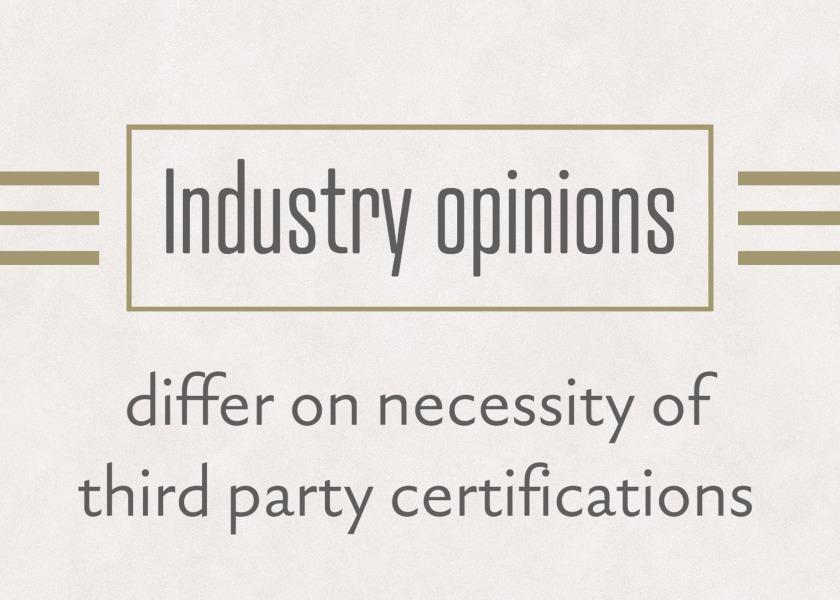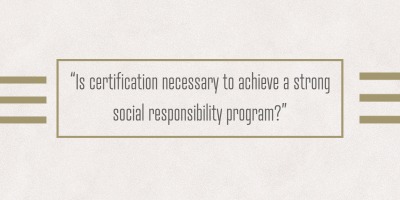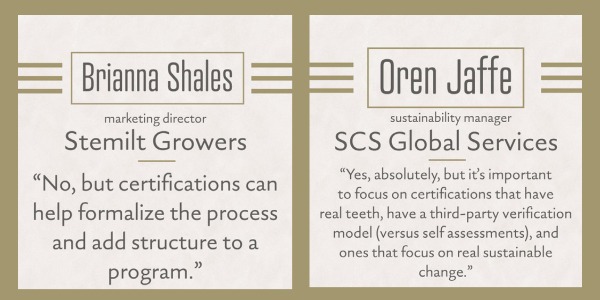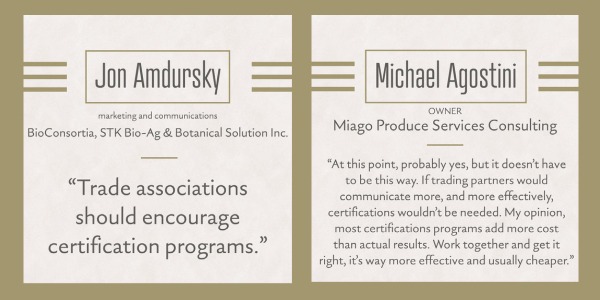Views differ on necessity of third party certifications

Read more on People First: A Spotlight on Social Responsibility
Industry opinion is split on whether third-party certification of a company’s social responsibility commitment is necessary to achieve meaningful results. Whether or not a third party certifies progress, others say company culture and passion is the most important factor of all.
Asked the question, “Is certification necessary to achieve a strong social responsibility program?” the industry offered strong opinions of “yes,” “no” and “maybe.”
Here are some responses from industry leaders who took The Packer’s survey.



More opinions:
- “Not always. It’s a mindset first.” — Natalie Nobbs, business development and grower relations for Calgary-based Thomas Fresh
- “Yes, to the extent that it aids in standardizing practices, elevates the farmworker, and keeps suppliers accountable.” — Trevor Terry, chief marketing officer for Kentucky Fresh Harvest
- “Certification is the best indicator of credibility, provided that the behavior matches the standard of excellence, good quality, good practice, good service. However, if actions and activities demonstrate social responsibility, then certification won’t matter. A clean person does not need a certificate of cleanliness.” — Abel Konan, economist with the Hawaii Department of Agriculture.
- “No. Certification for a social responsibility or sustainability program is essentially a marketing tool to give consumers a sense of relief and will pay more to buy more product. Many operations throughout the supply chain in one way or another have developed strong programs since the 1970s.” — Eric Valenzuela, director of food safety and sustainability for California Giant Inc.
- “At Windset Farms, EFI certification allowed us to build upon our already strong program by evaluating our current social responsibility level and improving upon areas needed via the certifications rigorous standards. Certification also gave our employees the confidence to trust Windset in always prioritizing them and their well-being, something that should be standardized across our industry.”
- — Claire Vasquez, sales and marketing assistant for Windset Farms
- “No, certification is not necessary, but it is helpful, especially if that certification has done a good job at branding itself (like the non-GMO project).” — Nell Krsnak, with the Breadroot Natural Foods Cooperative.
- “There are many certifications that aim to assess the impact of social responsibility programs. For Oppy, we’ve been Fair Trade certified partners since 2004 and have grown our program every year, generating $4.4 million since 2013 alone. While these certifications can certainly serve as a significant aid in realizing social responsibility programs by tapping into partners who already have the infrastructure needed to execute these programs, ultimately the only real necessity is an impetus towards sustainability from within the company itself.” — Steve Roosdahl, vice president of The Oppenheimer Group
Related:
Social responsibility programs can pay dividends in better labor relations
Industry gives favorable self-score on social responsibility, but point to barriers
Benefits and return on investment for social responsibility weighed







